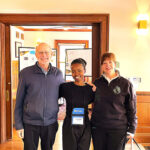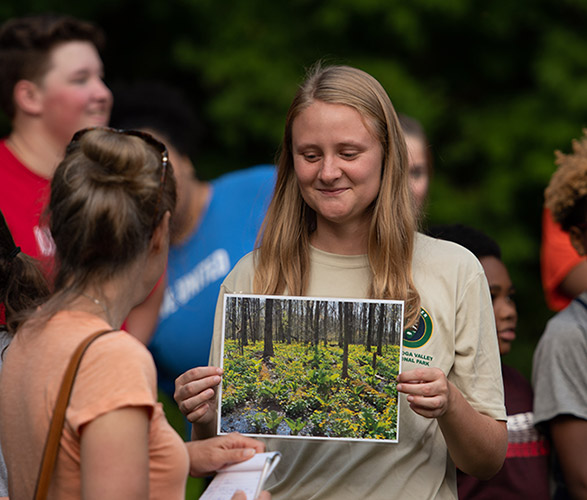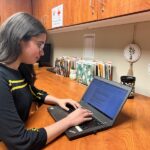
Cuyahoga Valley National Park through the ‘anthropological lens’

Growing up in Medina, Cami Miller ’20 frequently traveled to Cuyahoga Valley National Park when she was younger for class field trips, biking, and hiking. “The park has always held a very special place in my heart,” she said, but this summer, she took the opportunity to see it through “an anthropological lens” as a community engagement intern through Wooster’s APEX Fellowship program. “Getting to work here introduced me to the whole world of park service, and it’s been really amazing,” she added.
Though studying abroad in Granada, Spain at the time, as part of her Spanish minor and nurturing her passion for traveling, reading about the park’s internship program and mission statement online “immediately intrigued” Miller, and because the internship was unpaid, she knew she could work with APEX. “I knew it would be a great fit,” she said, making time to apply online from another time zone, “but I didn’t know I would love it enough to consider a full-time position in the area in the future. That’s really everything an internship should do.”
As one of 11 community engagement interns at Cuyahoga Valley National Park over the summer, Miller, an anthropology major, worked with park rangers to bring people and communities into the park who “don’t normally engage with the park and get them excited about it.” Often working with inner city kids, homeless shelters, and blind centers, Miller spent her days outside, setting up games, taking kids on hikes, train rides, around campfires, and roving the trails, making sure they were safe and talking with people she met. “Our main goal was to interact with as many people as possible throughout the day,” she said.
 On rainy afternoons, she developed pop-up exhibits for interpretation for parts of the park. The idea of “interpreting the land” meant describing the natural, historical, and cultural elements of a place or area and finding ways to talk to people about those ideas and about the nature and science behind them. For example, she explained an exhibit about restoration, “highlighting areas of the park that went downhill and then we brought them back,” including a beaver marsh that used to be a junkyard for cars. “Originally the city tried to clean it up for a parking lot, but the beavers came each time, so they decided to let them have it,” she said. “They knew the beavers could turn it into something better than we could. It’s become a beautiful wetland that supports river otters, turtles, snakes, blue herons, and so many animals. Highlighting stories like that is really important for the park.”
On rainy afternoons, she developed pop-up exhibits for interpretation for parts of the park. The idea of “interpreting the land” meant describing the natural, historical, and cultural elements of a place or area and finding ways to talk to people about those ideas and about the nature and science behind them. For example, she explained an exhibit about restoration, “highlighting areas of the park that went downhill and then we brought them back,” including a beaver marsh that used to be a junkyard for cars. “Originally the city tried to clean it up for a parking lot, but the beavers came each time, so they decided to let them have it,” she said. “They knew the beavers could turn it into something better than we could. It’s become a beautiful wetland that supports river otters, turtles, snakes, blue herons, and so many animals. Highlighting stories like that is really important for the park.”
Though previously nervous about public speaking, Miller felt more confident and found her skills improved as she “stood at the trail head, interacting with up to 50 people an hour,” she said. “It was all centered around the audience. I knew what I was talking about and practiced that skill almost daily.” Also telling stories and singing songs with the kids, Miller enjoyed “letting go of embarrassment to entertain the crowd.”
Throughout the internship, Miller enjoyed collaborating with the team of interns and rangers to build and create experiences that “expand who the park is able to impact and letting those people impact the park.” Interning in a national park allowed her to experience what it’s like to work in the field. “Every day it feels like I’m able to bring new joy to someone, and I love that,” she said. “To be seen as someone who’s valuable to the department and the office has been so rewarding. Being a part of this team has really meant a lot to me.”
Returning to Wooster for her senior year, Miller appreciated the guidance of faculty mentor Tim Freeze, professor of music, in reflecting on the internship from a long-term perspective. “He helped guide me in what I did every day and what I needed to keep doing to make sure this is beneficial for my future,” she said, now applying what she’s learned to her interest in nonprofits and considering pursuing a career in the national park service. “From an anthropological stand point, I enjoy looking at a wide variety communities and cultures and seeing how they function, where they’re in need of assistance or help and seeing what we can do for them,” she said. “I loved looking at the national parks field through an anthropological lens and seeing what works with these communities and how we or the park can benefit them.”
Posted in Experiential Learning on August 13, 2019.
Related Posts
Related Areas of Study
Anthropology
Use problem-solving and research skills to explore and understand communities and cultures in every part of the world.
Major Minor

